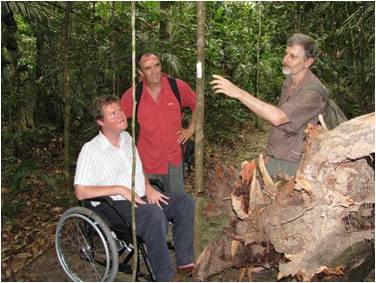Languages
Highlights
Blog with news of FLONA Amapá
The Federal University of Mato Grosso, through the Regional Center of Sinop, a member of INCT-CENBAM and PPBio approve the Graduate Program, Master level, entitled "Environmental Sciences".
This achievement is another action Sinop Regional Center INCT-CENBAM fulfilled.
The NR-Sinop was instituted in 2009, it has been home to various courses conducted by PPBio / CENBAM researchers and today has over 30 employees and three modules installed RAPELD. To learn more, visit the NR-Sinop page or get in contact with Domingos de Jesus Rodrigues (djrodrigues@ufmt.br, djmingo23@gmail.com).
I Symposium PPBio / CENBAM - Boa Vista, RR
Between October 18-20th, 2010 took place at the Federal University of Roraima Symposium PPBio - CENBAM. The event, which attracted more than 150 participants, aimed to promote dialogue between researchers from several Amazonian states and encourage the participation of graduate students and post-graduate in integrated research activities of the Center for Integrated Studies of the Amazonian Biodiversity (CENBAM) and the Program for Research in Biodiversity (PPBio).
CENBAM - First Results
The results below have been proposed in the INCT of the work plan, but were obtained without financial resources of the INCT, except the contribution of scholarship holders, and maintaining databases.
· The INCT-CENBAM articulated a partnership between IBAMA licensing industry, ICMBio, the Brazilian Forest Service and the Research Program MCT Biodiversity to implement a system of assessment and environmental monitoring coordinated between the various agencies, and the system already It is being implemented in impact areas of major works, protected areas and forest concessions.
· A project was prepared together with IBAMA to standardize the environmental impact assessment methodology using RAPELD system as a base.
· The INCT-CENBAM are working on a storage system and make available data in collaboration with CNPq LTER program to allow public access to data generated in ecological research of long-term sites.
Members of the INCT-CENBAM ministered data management courses to IBAMA, ICMBio and SFB in Brasilia and an integrated data management platform for environmental monitoring is under discussion.
· The INCT-CENBAM will provide technical support for environmental monitoring of the Brazilian Forest Service (SFB) in the first forest concessions (FLONA Jamari) under the new legislation.
· The INCT-CENBAM and Amazonas State agency responsible for the evaluation of environmental services (CECLIMA) are preparing a proposal for evaluation and financing of environmental services in Apuí mosaic of protected areas in environmentally sensitive border between the states of Mato Grosso and Amazon.
· As a result of the regional biota surveys, new species of plants, new occurrences of plants for states and Brazil, and the unexpected occurrence of large mammals in forest fragments, were recorded.
· Potential new uses (antioxidant activity, antifungal, antimicrobial, toxic) of seven plant species were released.

Researches from Griffith University Environmental Futures Center and the coordinator of INCT-CENBAM (L-R: Dr Ben Lawson, Dr Jean-Marc Hero and the Dr William Magnusson) inspecting a long-term ecological research site (LTER) near Manaus in April 2010.
SUMMARY OF RESULTS TO THIS DATE
A major constraint for Research in the Amazon is the lack of management strategies for scientific research on the scale of the basin. The implementation of the INCT-CENBAM reflects this lack of pre-existing infrastructure, direct funding of the INCT (~ 5% of the budget) was only implemented in February 2010. Permission to access funds for research was only given at the end of April 2010. Therefore, the results presented below were obtained through partnerships with member institutions to obtain scholarships and activities that do not require new funding. The first meeting of the administrative committee was held in Manaus in February 2010, coinciding with the meeting of another project partner, the Biodiversity Research Program (PPBio) attended by all members. This meeting was used to adjust the budget for the 20% cut suffered by all INCTs. The Coordination of Higher Education Personnel (CAPES), awarded the INCT with R$ 431,802.23 in scholarships for graduate students in July 2009, which was enough for 16 scholarships for master's, and these were passed on to graduate programs associated in six regional capitals. To date, about two-thirds of the 27 fellowship research available through the INCT-CENBAM were implemented. However, a course of Scientific Management was given in June 2010 to 19 fellowship holders currently associated through other funding agencies, who entered the CNPq / FAPEAM system in July-August 2010. Negotiations are under way to include new partners in Brazil (Brazilian Institute of Environment and Natural Resources Ronováveis - IBAMA, the Brazilian Forest Service - SFB), Bolivia, Colombia, Australia and Japan, but advances are still waiting for effective funding of the Institute by CNPq and FAPEAM. We still do not have access to CNPq funds due to problems with the SICONV system, which we hope will be resolved in the near future. The sources of the funds used: Biodiversity Research Program (PPBio / MCT / CNPq) CNPq Universal Notices, Notices Pronex / FAPEAM, etc.

